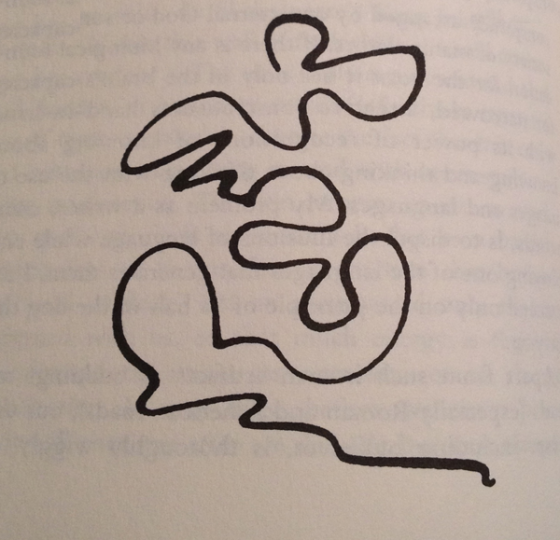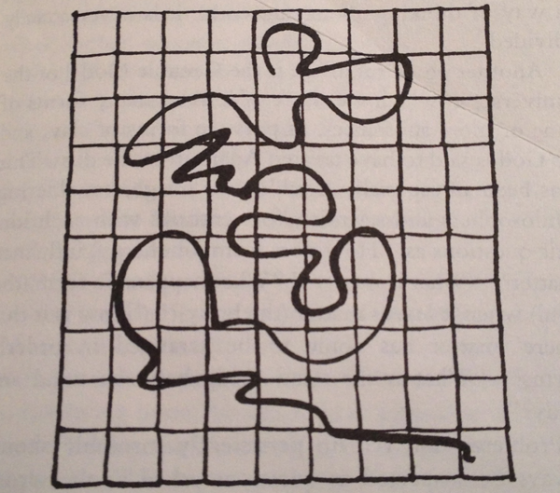The tyranny of category
Most of the world is curved. Other than some man made things, everything bends. Rivers, streams, trees, and coastlines are all less than straight. Even the paths we make when we find shortcuts through cities have arcing angles, and rarely run in straight lines.
Putting things in order has value and right angles have their place. Order can give clarity and simplicity. The city grid ensures neighboring streets are in parallel and not curved away from each other, which is a blessing when in a foreign place with a poor map. But organizing requires conformity, and conformity creates a tyranny over perception. While our universities divide the world into academic subjects, the world itself is not divided at all. The world has an infinite number of ways to be looked at. A bridge is not just engineering, it’s physics, commerce and aesthetics too. A person is not merely a name, they are biology, chemistry, physics, psychology, and metaphysics all at once. They can be a neighbor, a brother, a friend, a nemesis, simultaneously. We are multitudes and we, and everything in the universe, posses elements we may never define and that defy categorization.
The tyranny of category is when we think a thing is only what we have labeled it to be. A master of taxonomy and judgement has the illusion of expertise, since they choose what label an idea, or a person, is given. But like an olympic judge for gymnastics, the ability to score a performance on a scale from 1 to 10 is not the same as the ability to perform gymnastics itself. If you show me a soufflé, I can tell you what category of food it is, and judge it on how it compares to others I’ve eaten, but that does not give me the skill to make one. A film critic can harshly criticize a movie, but not possess any of the abilities required to make any film at all. The ability to categorize and critique has the pretense of superiority to creation, but not the substance.
In some cultures there is a tyranny of taxonomy. Nothing can be done without being categorized first. And that categorization limits the potential of the idea or the person since in a rigidly taxonomic environment, moving between categories is not allowed. The categories are primary, and the reality is secondary. It’s no surprise that these cultures produce square and lifeless things. Their obsession with order is contrary to the nature of ideas, and the world. Without constant reminders that categories are malleable inventions of convenience and not manifest in the world itself, the possibility of free thinking and progress is denied.
In Alan Watt’s The book: On the Taboo Against Knowing Who You Are, he offers a visual example of this problem. Compare this:

To this:

As Watts wrote:
[in the second drawing] order has been imposed on chaos. We can now say that the wiggle goes so many squares to the left, so many to the right, so many up, or so many down, and at last we have a number… However much we divide, count, sort or classify this wiggling into particular things and events, this is no more than a way of thinking about the world: it is never actually divided.
I will mark this post intentionally as uncategorized.

Reminds of a trip to Italy where on Oct 1 summer period was over. No A/C in the hotel, no swimming in the pool, no one at the beach. It was 88F.
lol
Have you read the book ‘everything is misclaneous’
Reminds me of an old favorite essay from Clay Shirky – http://www.shirky.com/writings/ontology_overrated.html.
Scott, by intentionally marking the post as uncategorized you already categorize it ;)
Hard to deny though, that measuring and comparing is deeply engrained in our daily life and ourselves. Faster, higher, better – we need measurements. Hard to just ‘let it be’, accept things for what they are, see the beauty around us.
Funny also how different cultures measure differently, not only in terms of units, but also based on their mindset. Take MPG in the US and L/100km in Europe (how much bang do I get for the buck vs. how much will it cost me to get where I need to go).
Cheers
Mike
Essentially the categorization of any epiphenomenon (see Hofstadter’s I’m a Strange Loop) is arbitrary, and we tend to do it with respect to only a limited number of dimensions.
Still, we cannot act on what we know if we cannot categorize it in some way, and then generalize it into ‘knowledge’. Our intrinsic need to over-simplify however dates right back to how we first believed that the world was only composed of simple geometric shapes. We are, as a species, incapable of dealing the full complexity of our environment. It’s a finite limitation on our intelligence.
Paul.
Very interesting post. Thank you Scott.
We live around labels. Everything and everyone is categorized somehow. Labelling makes like “easier”: if you label X or Y as a democrat (or republican), you just assume that they are as any other D or R out there.
The challenge, I believe, is to remember that labels (in many cases) are judgements, and not because you label something differently than me, you are superior or inferior.
Yo need to study dialectical materialism and the Marx fight against idealism (idealism == put concepts into inmmutable and eternal categories).
A lot of people seem to be noticing the breakdown in the utility of categorization. I suspect it has something to do with belonging to the right age range during the explosion of musical genres (and academic disciplines, and plenty of other culturally important phenomena) around the millennial cusp.
Categories are only really useful if they’re disjoint. That way you can say that an object belongs to set X and only X (and most certainly not to Y). You can dedicate a wing of a building to it, or shelf space in a library. You can allocate capital to it from a centralized administrative entity, and as such you can unambiguously own it.
And that really seems to be what categorization is about: the rational partitioning of epistemological constructs to interested parties. It’s a form of market division, one so old that we tend to perceive it as a self-evident natural order.
If you own a lexicon, you control the argument. You define the battleground, where, as an expert, you will invariably be at home. As such, people largely leave you alone, which yields a fantastic opportunity for rent-seeking.
Of course experts do copious legitimate advancement of their respective bodies of knowledge—that’s the meat of their arrangement with society at large. What’s interesting is how these corpora are starting to collide, and likewise to leak, if not outright hemorrhage from their respective institutional enclaves. Things are just now starting to get interesting.
Hey Scott — I wanted to leave a real response, but I’m in the middle of a card sort, so… maybe later ;-)
Happy sorting :)
Thanks for this great perspective on the idea of category. I loved this quote: “A master of taxonomy and judgement has the illusion of expertise, since they choose what label an idea, or a person, is given.” Thanks!
– Kate
Thanks for this. Tyranny is a harsh word but there’s no denying that the *single* category paradigm is *now* a straitjacket. I say *single* because multiple categories can be assigned to any one thing. I say *now* because the ancient practice of an hierarchical taxonomy, having served so well for so long, is today usurped by the web, the network, the many-to-many.
I want to go with you on this…but don’t we have in our visual cortex cells that respond to categories such as lines, shapes, movement..even faces.
I don’t understand your comment. You seem to be asking a question but I’m not sure what it is.
Of course our visual cortex responds to lines and shapes, but our visual cortex responds in some way to anything that is illuminated. I don’t know why that’s a useful criteria.
The fact that we respond to faces is fine. It’s when we start categorizing them, and believing the categories are manifest in the world itself and not in us, that’s where there’s a problem.
Another fun example is the difference between a flower and a weed. A dandelion looks and acts pretty much like a flower, but someone decided it’s a pest, and now we call it a weed. Why? Is there something in the dandelion that makes it a weed? We make up categories because they are helpful at times, but they are also limiting and artificial.
Great point about how we sometimes miss the forest for the order and species of trees. We like to categorize and file away problems, ideas, and theories, but in real life, it’s often just impossible. Kind of related to your post is this video about the US/Canada border, which we all think is a straight line, but in actuality, isn’t at all: http://www.youtube.com/watch?v=qMkYlIA7mgw
Great link – thanks, hadn’t seen that.